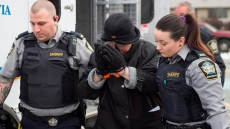TORONTO — Some Canadian cities and police forces already wrestling with cash-flow shortages are moving toward outfitting officers with body cameras despite privacy concerns and scant consensus on the technology's cost-effectiveness.
Body camera programs aren't cheap, according to multiple forces across the country, and would require hiring more personnel to deal with the hundreds and thousands of hours of footage. Storage costs alone can run in the millions of dollars.
Nonetheless, proponents say the cameras provide better evidence, lead to more convictions, improve officers' interactions with the public and reduce police use-of-force incidents.
Others, however, argue the videos invade the privacy of citizens, and worry that administrative duties related to body cameras will keep officers away from policing.
Edmonton police conducted a comprehensive three-year pilot program that involved the use of 55 body cameras in a variety of areas from downtown patrol beats to the entertainment district and impaired driving investigations.
The project ended in 2014. Police concluded the cameras had no effect on police use-of-force incidents and said there was no statistical difference in resolving police complaints.
Edmonton Mayor Don Iveson says there isn't a good business case for the program.
"We're already at our wit's end trying to fund basic policing and all the social work our officers are doing," Iveson said in an interview.

"I'm not really interested in picking up the freight for a lot of cameras and hard drives on top of that."
Video storage fees are often overlooked by body camera supporters.
It would cost Toronto police about $18 million a year to store videos on a server if they were to outfit all front-line officers — numbering more than 3,000 — according to Insp. Michael Barsky, who is the operational lead for the force's year-long pilot project that wrapped up late last week.
Hamilton police have said a complete body camera program would range in cost from $6.9 million to $14.8 million over a five-year period.
"The most significant and incremental cost relates to data storage and management," Supt. Paul Morrison said last year.
Police forces have two general options for data storage: a cloud-based server hosted by a third party, or local storage — essentially giant hard drives that police forces own and and operate themselves.
Police in Canada are loathe to hand over videos to a third party, particularly one based in the U.S.
"It was a non-starter for us," said Barsky of the Toronto police.
The force, he said, opted for in-house storage because it wanted complete control over data for security reasons. There were also concerns that the U.S. Patriot Act allows American authorities to access data that is stored in their country.
But in-house data storage comes at a steep cost, and companies such as Taser are hoping to grab a slice of the body camera pie in Canada.
Last summer, the company launched Axon Public Safety Canada — a subsidiary of Taser International Inc. that offers body cameras and video management products to police forces across Canada — with servers now physically located in the country.
"We've recommitted ourselves to Canada," said Taser spokesman Steve Tuttle.
"It is a tremendous opportunity for us."
The company offers Evidence.com, a service, Tuttle explained, that allows police to save videos and use custom tools to blur faces in an effort to to diminish privacy worries.
Tuttle said business has boomed south of the border after riots broke out in Ferguson, Missouri, after a black man was fatally shot by a white police officer. There is no known video of the event.
"It's not a panacea, but I think we would have had a different outcome had we had video," Tuttle said. "I think Ferguson woke up every chief of police."
President Barack Obama wants to outfit police forces across America with 50,000 police body cameras, and U.S. Congress recently approved a $75 million three-year funding program to help buy them.
In Toronto, there is political will to give body cameras to frontline officers. Mayor John Tory has urged police chief Mark Saunders to act swiftly upon completion of the pilot program. The chair of the Toronto police board echoed Tory's sentiments.
What happens in Toronto could determine the situation in the rest of the province.
Ontario's police forces — save for a small force in Amherstburg that has already outfitted all 16 of its frontline officers with cameras — are watching Toronto following a directive from The Ontario Association of Chiefs of Police, which is supported by the Ministry of the Attorney General, Barsky said.
"We have to be very aware that bad policy in Toronto creates bad case law in Canada," Barsky said.
Barsky said storage is the most significant cost of the program, but a close second would be the personnel required to manage and deal with all the video.
He said the 85 officers involved in the pilot project could spend up to three hours of 10-hour shifts off the street tending to tedious administrative duties related to the videos: from uploading and tagging the videos to going through each video and noting who and what needs to be redacted.
And they have to keep some of those videos for upwards of 11 years if it involves a criminal case, compounding the storage issue over time.

In Vancouver, police have opted out of the body camera game for now.
"The cost of retention, storage and use of the massive amounts of data that will be generated remains a significant hurdle," said Vancouver Const. Brian Montague.
Meanwhile, the Calgary police force is rolling out the devices over the next year after purchasing 1,100 cameras from a Utah-based company.
And they've figured out a cheap and old-school way to store all the videos from their $1.3 million program: storage tapes.
"It sounds archaic, but it's not," said Staff Sgt. Todd Robertson.
"It's like a large robot attached to a server. As that server is about to fill up it dumps that data onto the tapes and the videos can remain on those tapes uncorrupted fo 60 to 70 years. And those tapes are cheap, so storage cost wasn't a deciding factor for us."


